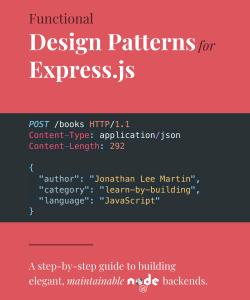About This Title
Pages: 141
Published: September 2019
ISBN: 9781074005306
In Print
Functional Design Patterns for Express.js
by Jonathan Lee Martin
Ready to design Node.js backends that scale elegantly with new features and are a pleasure to maintain? Learn to apply functional programming patterns that transcend Express.js—these ideas are found in exceptional production codebases of all kinds. Whether you’re a seasoned back-end developer, front-end developer or recent web boot camp graduate, this step-by-step guide is for you.
This work was written and produced entirely by the author. We are proud to be distributing it.
eBook Formats:
PDF for desktop/tablets
epub for Apple Books, e-readers
mobi for Kindle readers
Get all eBook formats here for $24.95 (USD)
Express is arguably the ubiquitous library for building Node backends. As of mid-2019, it is a dependency of 3.75 million codebases on Github alone. So if you hop into a Node codebase, chances are Express is part of it.
Starting from an empty directory, we’ll build a full-featured Express backend together and intentionally bump into codebase growing pains to motivate functional design patterns and Express features. With this book, you’ll:
- Learn Express.js by building a pure backend with authentication from scratch.
- Apply best practices to architect resilient, testable Node.js backends.
- Expand your design palate with functional design patterns that transfer to any tech stack.
- Demystify key web abstractions by deriving each layer yourself, then abstracting it away.
Based on real-world consulting experiences, this book features a razor-focused set of topics and tools you’ll actually use, without introducing any simplistic “code smells” or bad habits.
So whether you’re a seasoned back-end developer, front-end developer or recent web boot camp graduate, this step-by-step guide will help you develop exceptional Node backends that will outlive Express and expand your design palate with functional programming patterns for any tech stack.
What You Need
- Node 10 or higher
- A text editor
Resources
Releases:
Contents & Extracts
- Acknowledgments
- Technical Reviewers
- Introduction

- Why Express?
- Approach
- Topics
- Prerequisites
- Let’s Get Started
- Express Essentials
- How Servers Talk
- HTTP: The Core Abstraction of the Web
- Installing telnet
- On Linux
- On macOS
- An HTTP Conversation with telnet
- Talking to a Backend API
- Making Requests with Insomnia
- Go Further
- Responding to Requests
- Simple Servers with the http Module
- Speaking HTTP over Telnet
- Responding to Different Routes
- Hello, Express
- Express Shorthands
- Go Further
- Multiple Response Types
- Express Router
- Refactoring with the Router Pattern
- Express
Router

- Functions with Methods
- Routes with Dynamic Segments
- Using Multiple Routers
- Extracting Routers into Files
- Go Further
- Routing on the Accept Header
- Working with Request Bodies
- Request Body Lifecycle
- Reading Request Bodies
- Finishing Up the Create Endpoint
- Update and Delete
- Express .route() Method
- Go Further
- How Servers Talk
- Middleware
- Middleware

- Cross Cutting with Middleware
- Passing Data to Routes
- Route Middleware
- Middleware is Everywhere
- Go Further
- Error Handling Middleware
- Common Middleware
- Logging with Morgan
- Body Parser
- Middleware Factories
- Compression
- Serving a Frontend
- File Uploads with Multer
- Serving Static Files with a Path Prefix
- Accepting Multiple Body Types
- Go Further
- URL Encoded Bodies
- PATCH Things Up
- MIME Types
- Middleware
- Authentication & Authorization
- Basic Authentication
- Authorization Header
- Handling Authentication with Middleware
- Graceful Global Middleware
- Requiring Authentication
- Creating a Middleware Factory
- Currying and Middleware Factories
- Go Further
- Hashing Passwords
- Authentication with JSON Web Tokens
- Proof of Verification
- JSON Web Tokens
- Issuing Tokens
- Signing Tokens
- Dissecting a Token
- Accepting JSON Web Tokens
- Dealing with Invalid Tokens
- Decoupling with Middleware Factories
- Go Further
- Environment Variables
- Authorization Design Patterns
- Adding Authorization to a Route
- Authorization Design Flaws
- Extracting Authorization to Middleware
- Policies and Enforcers
- Simplifying Policies
- Enforcing Policies with Exceptions
- Sustainable Security
- Go Further
- Enforce All the Things
- Private Attachments
- Index
- Basic Authentication
Author
Jonathan Lee Martin is a globetrotting educator, author and international speaker with a passion for craft. He’s trained hundreds of developers—from career switchers to senior devs at NASA and HP—in immersive bootcamps. He also helps working web developers craft exceptional code through his screencast series, TL;DR. While waiting onnpm install, he travels the world as a
fine art landscape photographer.
eBook Formats:
PDF for desktop/tablets
epub for Apple Books, e-readers
mobi for Kindle readers
Get all eBook formats here for $24.95 (USD)
Related Titles:
About This Title
Pages: 141
Published: September 2019
ISBN: 9781074005306
Edition: 1
In Print


